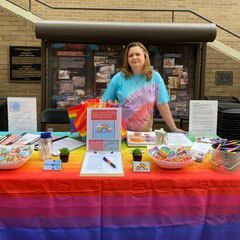
Considerations for Supporting LGBTQ+ Individuals with Dementia
Past trauma is a significant challenge for many older adults, but is especially problematic for LGBTQ+ older adults since it directly impacts, limits, and intersects their experiences as an aging individual. Why?
- LGBTQ+ older adults in many cases have been forced to live through a history of discrimination, ill treatment, and persecution.
- Coming of age at a time marked by great prejudice, legally and medically sanctioned discrimination, and violence against them has left a lasting imprint on many.
- Being born at a time when consensual same-sex activity was illegal in all 50 states has created long-term stress, fear, and apprehension - as it was only in 1973 when being gay was finally made legal.
- Past medical labeling of having a mental disorder, sadly at times validated prejudice, insecurities, and inappropriate, and ill treatment.
- Even today many states have no laws prohibiting discrimination against LGBTQ+ individuals and this lack of legal protections and experiences of discrimination retraumatizes individuals and leads to a longstanding distrust of mainstream institutions.
As a result, LGBTQ+ older individuals who develop cognitive impairment and dementia sadly face an even more challenging set of circumstances. In order to best support LGBTQ+ individuals in the community, one needs to have a better understanding of their past and present in order to break dysfunctional cycles and begin setting a positive foundation for change.
Although LGBTQ+ older adults have clearly seen monumental change across their lifetimes and are often strong, determined, and resilient, many still struggle with complex feelings due to current and past experiences. Many are without children of their own, have been dismissed by and are estranged from their legal or biological families and only have chosen families for support. Chosen family members are often contemporaries who are also aging and can no longer provide support, which at times leads to fear and uncertainty.
Due to past trauma and even recent experiences, LGBTQ+ older adults remain resistant even when needing to accessing outside help and often avoid preventative and essential care and entitlement programs while often having fewer financial resources and less or nonexistent support networks. The result of these dysfunctional patterns leads to significant holistic health disparities, challenges, isolation, and ineffective coping mechanisms.
In addition, LGBTQ+-identifying caregivers have to navigate past similar challenges. Adult children who are LGBTQ+ are often relied upon and used by siblings as primary caregivers for parents. This may create trauma if being forced to care for a parent who does not fully accept their sexual orientation, gender identity, or gender expression, thus adding further to the psychological burden of being a caregiver.
As dementia progresses for an LGBTQ+ individual, many changes may occur in terms of their cognition and behavior. Their sexual expression may change and they may even begin to relive traumatic experiences from the past. Recognizing and connecting with individuals where they are cognitively and helping to positively redirect and navigate past challenging emotions when they emerge is critical. Individuals may need to live in a care community over time due to dementia, which can create anxiety and tax one’s cognition.
Creating safe spaces through cultural competency training, and environments that recognize and affirm everyone’s right to sexual expression, where all individuals feel welcome through decor, inclusive language, programming, and celebrations for all can help ease transitions and support long term comfort. Flyers celebrating Pride Month and programs and celebrations for all people along with gender affirming language and an overall inclusive community culture sets the stage for comfort and inclusion. Many LGBTQ+ individuals will not fully utilize care community resources and will take more time to adjust; therefore, more frequent check-ins over time and support to foster change and inclusion is vital.
Community care support networks can also take many forms and community members are key in creating positive moments and impacting change for LGBTQ+ older adults and their caregivers. It is important that LGBTQ+ older adults feel understood, supported, and safe reaching out and connecting with others. This often takes time, so remember:
- Let them drive the process by being an active listener. Seeking to understand will assist individuals in establishing trust and help to minimize and avoid any potential triggers from the past emerging.
- Once trust is formed, it is important to check in often, slowly assist them in expanding their definition of family and growing their support team.
Once you’ve gained trust, here are a few ways you can be supportive:
- Offer to help them in finding an inclusive care provider, support group, or socialization programs to expand their network.
- Offer to attend an appointment or program if they are scared or resistant to go alone. Help them to slowly branch out safely and on their terms.
- Let them know that you care through inclusive language and actions.
- Help them to realize through action that you understand and that they can trust and rely upon you.
When we take proactive steps to seek understanding, foster connection, and build trust slowly, we can make a huge impact on others and can create a world where LGBTQ+ individuals with dementia and their caregivers can feel safe and supported.
For more information on supporting LGBTQ+ Older Adults:
Author
Karen McPhail, RN, BSN, MSN, CCM, CDP, is a professional care manager, health care consultant, writer, blogger, and public speaker with over 30 years of experience in the healthcare industry. She is the Executive Director of Eldementals, LLC and the Founder/Director of Aging Rainbows. Karen actively participates in multiple clinical committees, serves on many state and local advisory boards, and extensively serves her community through her support and participation in charitable and non-for-profit organizations. Karen is the President Elect for ALCA for the MidAtlantic Region.
Blog
"I like that IMCC focuses on dementia-related problems and provides a focal point for families to network and socially interact in coping with dementia. It provides a community that helps us in our struggle."







